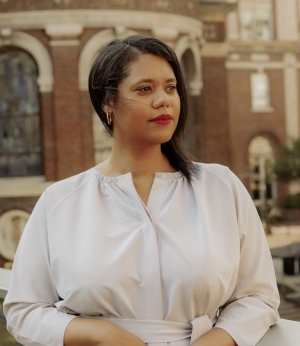
EMILY DENNY
What is the best part about teaching the Core Curriculum?
There are so many — I don’t know if I can pick one thing! The most obvious is getting to work with so many undergraduates; for me, it’s just wonderful to meet and work with such a vast number of super-interesting young people. That inherently influences how I think about music and my practice; it’s lovely to build that creative relationship on a regular basis.
And because the class sizes are relatively small, you do really get to build up those sorts of relationships. Most students like music, they enjoy music, but they might not come from a background of musical knowledge. And so it is a pleasure to show eager people how to delve into music from the medieval period right up to the present day, and to really hone in on deep listening — not only to music, but also listening to each other, with great detail and focus.
How do you innovate and/or bring your own spin to Music Hum?
Because I’m a practicing composer, I think that students appreciate my personal perspective about the historical composers we study, and how their contexts and environments influenced the music they were writing. I can speak specifically about writing for orchestra, and so if we’re considering how Beethoven might have felt when he was writing the Fifth Symphony, I can reference how I feel when I’m presenting a new orchestral work for the first time — the insecurities and vulnerabilities, the living, breathing experience of it. It’s great to be able to communicate with that level of detail.
Also, I think on the whole that students generally know about songwriters, but not necessarily about living composers who are writing contemporary classical music. I like that they’re able to ask me about that, or about my colleagues who are musicologists and theorists and might have a personal take about whatever we’re discussing on the syllabus.
What are you teaching that feels especially relevant for this year?
One of the assignments I brought forward in the past year has been a collaborative composition assignment. It speaks to the fact that composers don’t make music in a silo — they’re doing it within their specific political and historical contexts. So I’m asking students to consider what's happening at the moment and, in their own way, convert that into sound and composition. And the fact that it’s collaborative means that they have to work with their peers and compromise on how to come up with cohesive, relevant work that speaks to today. I assign them to a group, to get them out of their friendship circles and find ways to work with creative partners whom they might not ordinarily choose. This is the first year I’ve done it, but I’ve already have had some really lovely feedback and great pieces.
What has been your favorite Core Curriculum teaching moment?
Some of the best moments are when I get emails or messages after the class. I recently got a message from a student saying, “I was listening to these medieval chants, and I was just wondering about the configuration of instruments that are supporting the vocals, because it’s unusual.” She was really excited and wanted to have a discussion with me about it. And you know, when a student just wants to talk to you about obscure medieval songs, that’s really cool.